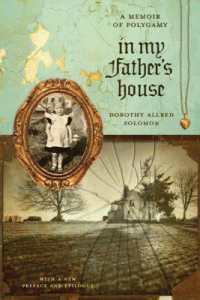- ホーム
- > 洋書
- > 英文書
- > Performing Arts
Full Description
NEW CATALOG COPY (announcing paperback edition):
In The Generation of Plays, Karin Barber recounts the history of the Odin Adéjobi Theater Company and uncovers the pulse points of generation, production, and improvisation that merge when a Yorùbá popular drama is brought to the stage. This rich and detailed book opens a window into the social and cultural worlds of actors and audiences.
ORIGINAL CATALOG COPY:
"Karin Barber has given us a vivid picture of one of the most vital forms of modern African popular art. It is beautifully written and informed by a deep affection for the subject . . . . a major contribution to the cultural history of Nigeria." —J. D. Y. Peel
From the 1940s to the 1980s, Yoruba popular theater was one of the most spectacularly successful theaters in Africa. Today, these traveling companies have virtually disappeared, largely as a result of economic hardship and the rise of video entertainment. In The Generation of Plays, Karin Barber recounts the history of the Oyin Adejobi Theatre company. Drawing on archival sources as well as extensive interviews and transcriptions of plays, Barber uncovers the pulse points of generation, production, and improvisation that merge when a Yoruba popular drama is brought to the stage. Barber reveals the personalities of the principal actors, how plays are created—from the germ of an idea through the logistics of rehearsal and staging—how a play is made meaningful to its audience, and how a play changes and develops after several productions or according to the sensibilities of its viewers. The expansion of popular drama into television is also considered. This rich and detailed narrative illuminates notions of gender, language, politics, and self as they are expressed in popular cultural forms. It affords a unique view of the social and cultural perspectives of the actors and audiences involved in what was a flourishing and vital enterprise.
Contents
Preliminary Table of Contents:
Acknowledgments
A Note on Orthography
1. Introduction
2. The History of a Founder, a Genre, and a Public
3. The Actors
4. Getting a Show on the Road
5. The Generation of Plays
6. The Filling Out a Play
7. Audiences
8. Television, Film, and Video
9. The World of the Work: Place, Gender, and Politics
10. Literacy, "Enlightenment," and "Tradition"
11. Work, Destiny, and Self-making
12. Language and the Moral Public
13. Conclusion: The Lessons of Example
Appendix 1: Synopses
Appendix 2: Yorùbá Text of a Sene from Taking Care of Kúnlé
Notes
Bibliography
Index








